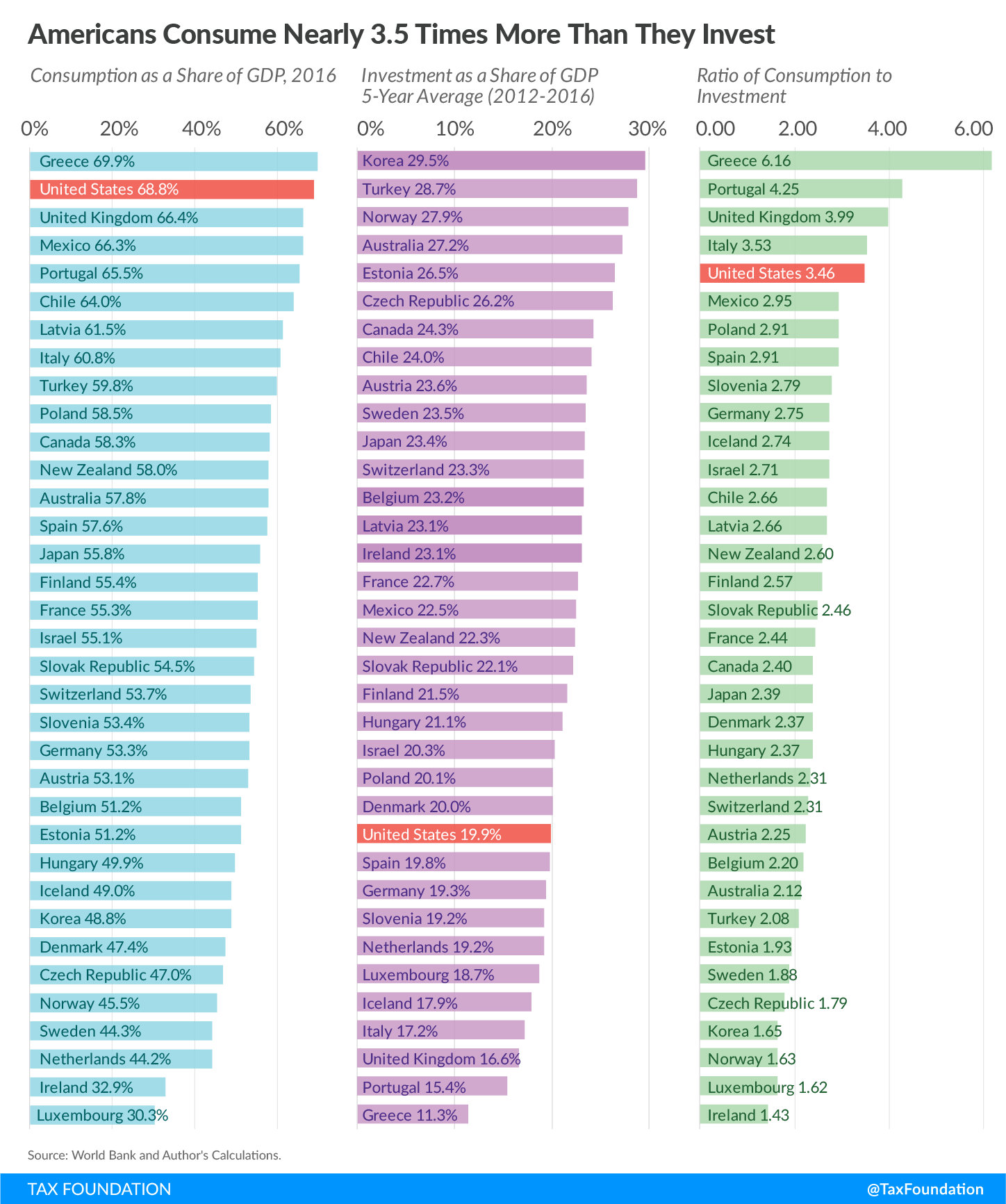A key trade-off we all face is whether to consume today or save and invest for tomorrow. What we decide has consequences for our personal financial health as well as the health of our national economy. Recent data from the World Bank show that as a whole, Americans stand out for consuming much more than they invest, and this is due in part to the taxA tax is a mandatory payment or charge collected by local, state, and national governments from individuals or businesses to cover the costs of general government services, goods, and activities. code’s bias against savings.
Consumption and investment make up two large components of Gross Domestic Product (GDP). In the United States, consumption outsizes investment by a magnitude of nearly 3.5 times, a ratio topped by just four other Organization for Economic Co-operation and Development (OECD) member countries (Greece, Portugal, the United Kingdom, and Italy). In 2016, Americans consumed about 69 percent of GDP, higher than any developed country except Greece, while investing about 20 percent of GDP, less than most developed countries.
The tendency to consume significantly more than we save has serious long-term implications. In essence, this choice trades future consumption for current consumption, and there is an inherent loss of wealth in this process.
Here’s a quick illustration. Consider a person who spends their full paycheck each month, perhaps eating out at restaurants or shopping. Their earnings are gone, they didn’t save for retirement, to buy a house, or for unexpected costs, and as a result, they are not any wealthier at the end of the year. If instead they had saved and invested a portion of their salary, they would have been wealthier at the end of the year.
What is true at the individual level is largely true at the national level. The choice to forgo near-term consumption in favor of longer-term savings is necessary to generate higher levels of future economic activity.
When more people save their money and, for example, deposit it into banks, banks then have more to lend to businesses to expand or to purchase new equipment. This is what economists call investment, and it is the process by which financial savings are turned into real assets. Through this process, the benefits of individual savings are shared more broadly as new investments lead to more productivity, increased wages, and more goods produced overall for consumers to use.
But, long-term savings have long been in decline in the U.S., and these data show that we are continuing a pattern of immediate consumption—on a nationwide scale, this negatively impacts investment and economic growth.
The tax treatment of savings and investment is one of the factors contributing to this tendency. Under most circumstances, savings are subject to double taxationDouble taxation is when taxes are paid twice on the same dollar of income, regardless of whether that’s corporate or individual income. . At the individual level, this occurs when people pay taxes on the money they earn and then pay taxes again when that money earns a return in a savings account or other financial investment. This reduces the after-tax returns to saving and in doing so incentivizes near-term consumption over saving. Though the tax code offers some reprieve through tax-neutral savings accounts like 401(k)s or IRAs, these are narrow and subject to complex rules.
Businesses are also subject to two layers of taxation, one at the corporate level and a second at the shareholder level, that likewise discourage investment. The Tax Cuts and Jobs Act should relieve some bias against investment for the business community as it reduces the statutory corporate tax rate, allows full expensingFull expensing allows businesses to immediately deduct the full cost of certain investments in new or improved technology, equipment, or buildings. It alleviates a bias in the tax code and incentivizes companies to invest more, which, in the long run, raises worker productivity, boosts wages, and creates more jobs. for five years, and moves to a territorial tax systemA territorial tax system for corporations, as opposed to a worldwide tax system, excludes profits multinational companies earn in foreign countries from their domestic tax base. As part of the 2017 Tax Cuts and Jobs Act (TCJA), the United States shifted from worldwide taxation towards territorial taxation. .
Hopefully, lawmakers continue to review the tax code to find ways that make it neutral across different types of economic activity, like consumption and investment. Further improvements to ensure that the rate of return on savings and investment isn’t artificially reduced through taxes could help remove the incentive for immediate consumption and help lift long-term economic growth.
Stay informed on the tax policies impacting you.
Subscribe to get insights from our trusted experts delivered straight to your inbox.
Subscribe